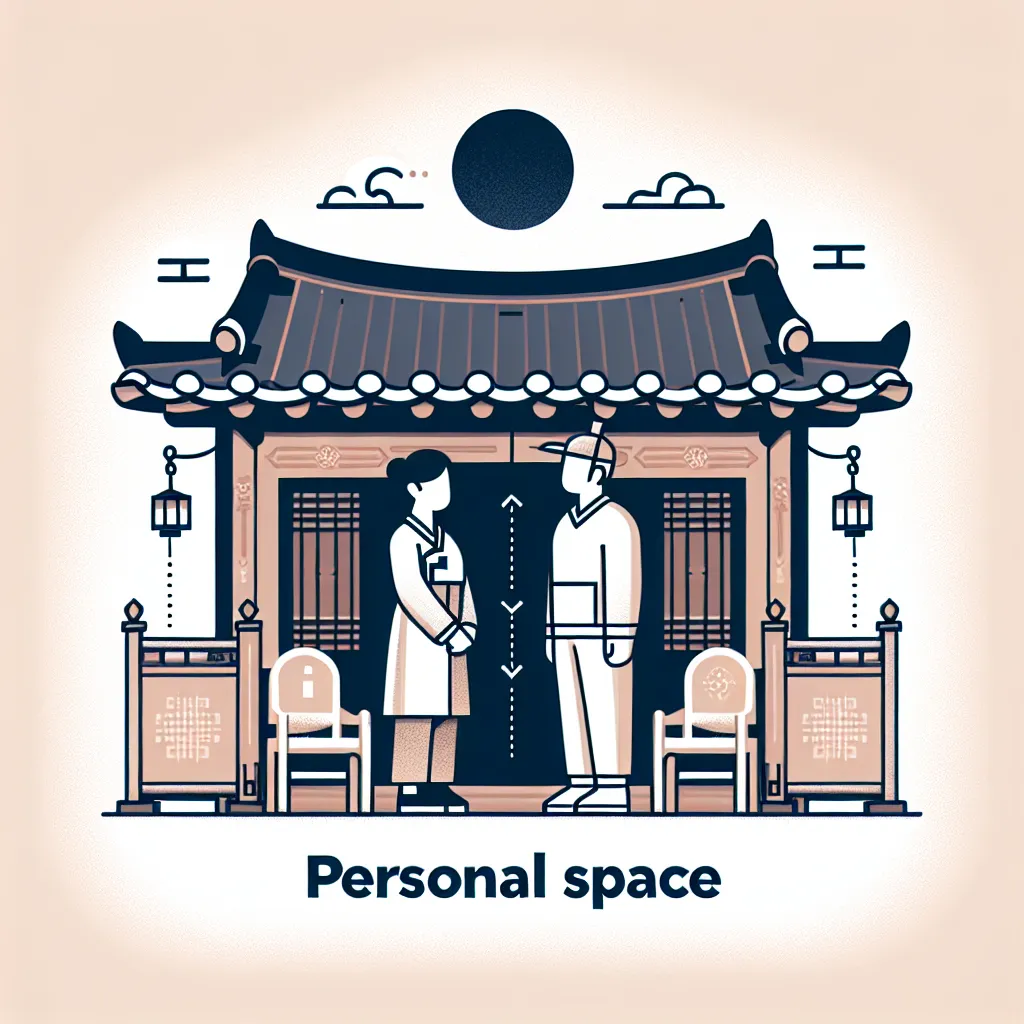As we delve into the intricacies of Korean social norms, one aspect that stands out is the concept of personal space. Understanding and respecting personal boundaries is crucial in any culture, but in Korea, it holds particular significance. The way individuals interact and the distance they maintain from each other can convey a lot about their relationship and level of respect. Navigating these proximity norms can be a fascinating journey, offering insights into the cultural fabric of Korean society. Let’s explore the cultural nuances that shape these social etiquettes and delve into the importance of personal space in Korean interactions.

Respecting Personal Boundaries in Korea
Understanding and respecting personal space is a crucial aspect of social interaction in any culture. In Korea, the concept of personal boundaries holds significant importance in daily interactions. Koreans generally value a certain level of physical distance when communicating with others. According to a study conducted by the Korean Culture and Information Service, it was found that the preferred interpersonal distance for Koreans in casual social settings is around 1.2 meters.
The Importance of Personal Space
Maintaining appropriate physical distance is not only about respecting personal space but also reflects cultural norms and values. In Korea, individuals are mindful of not invading others’ personal space, especially when in public places such as crowded subways or buses. It is common to observe people standing at a distance from each other in queues or while waiting for public transportation.
Verbal Communication and Personal Boundaries
The Korean concept of personal space extends beyond physical proximity and also includes aspects of verbal communication. Koreans tend to be more reserved in expressing emotions or opinions openly, particularly with acquaintances or strangers. This reserved communication style is rooted in the cultural emphasis on harmony and avoiding conflict in interpersonal relationships.
Cultural Gestures and Body Language
When interacting with Koreans, it is essential to be mindful of their personal boundaries and adapt your behavior accordingly. Avoiding physical contact, maintaining an appropriate distance, and being respectful in communication are key elements in demonstrating consideration for Korean social norms.
In Korean society, gestures and body language also play a significant role in signaling respect for personal boundaries. Bowing is a common form of greeting in Korea, and the depth of the bow may vary depending on the level of respect or formality involved in the interaction. Additionally, avoiding direct eye contact or speaking in a softer tone are considered signs of respect for personal space.
Overall, understanding and respecting personal boundaries in Korea is essential for fostering positive relationships and demonstrating cultural sensitivity. By being mindful of the cultural norms regarding proximity and communication, individuals can navigate social interactions in Korea with respect and consideration for others’ personal space.
Remember, respecting personal boundaries in Korea is not just about physical distance; it is a reflection of cultural values and norms that shape interpersonal relationships in Korean society. So, next time you find yourself in a social setting in Korea, remember to be mindful of personal space and adapt your behavior to show respect for Korean social norms! 🇰🇷✨
Cultural Importance of Personal Space
Personal space is a concept that varies across different cultures, and understanding the cultural norms surrounding it is crucial for effective communication and social interactions. In Korean society, personal space is often perceived differently compared to Western cultures. Koreans tend to have a closer proximity when interacting with others, whether it be in public spaces, at work, or even among family and friends.
The Influence of Confucian Values
In Korea, the concept of personal space is influenced by Confucian values that emphasize harmony within relationships and respect for hierarchy. As a result, physical closeness is often seen as a sign of intimacy, trust, and connection. For example, it is common for friends to stand or sit closely together while engaging in conversation, and physical touch such as patting someone on the back or holding hands is considered a friendly gesture.
Moreover, the importance of personal space in Korea can also be observed in public settings such as public transportation or crowded areas. Koreans are accustomed to being in close proximity to others in these situations, and it is not uncommon for strangers to stand or sit closely next to each other without feeling uncomfortable. This cultural norm reflects the collective mindset of Koreans, where the needs of the group often take precedence over individual preferences.
Understanding and respecting these cultural norms regarding personal space is essential when interacting with Koreans, whether it be in a social or professional setting. Being aware of these differences can help avoid misunderstandings and promote positive relationships. By recognizing the cultural importance of personal space in Korea, individuals can navigate social interactions more effectively and build stronger connections with others.
In conclusion, personal space holds significant cultural importance in Korean society, reflecting values of harmony, respect, and interconnectedness. By acknowledging and adapting to these cultural norms, individuals can enhance their cross-cultural communication skills and foster meaningful relationships with others in Korean society. 🌟🤝🇰🇷
Social Etiquette in Korean Society
Hey there, let’s dive into the fascinating world of social etiquette in Korean society! When it comes to personal space and proximity, Koreans have their own set of norms and expectations that may differ from what you’re used to. Understanding and respecting these cultural nuances is key to building positive relationships and avoiding unintentional misunderstandings. So, let’s explore some of the unwritten rules that govern social interactions in Korea!
The 1-Meter Rule
In Korean culture, there is a general preference for maintaining a distance of about one meter between individuals during casual interactions. This space is seen as a comfortable buffer that allows for respectful communication without invading personal boundaries. So, if you find yourself in a social setting in Korea, be mindful of this invisible boundary and try to maintain a respectful distance.
The Art of Bowing
Bowing is a traditional form of greeting in Korea that reflects respect and humility. The depth of the bow and the duration can vary depending on the social context and the relationship between individuals. A slight nod of the head is often used in more casual settings, while a deeper bow is reserved for formal occasions or to show deep respect.
Handshakes and Physical Contact
While handshakes are becoming more common in business settings, physical contact in general is less common in Korean culture, especially between individuals of different genders. Instead, a polite nod or a slight bow is a more appropriate way to greet someone you’ve just met. It’s always a good idea to follow the lead of your Korean counterparts in these situations.
Sharing is Caring
In Korean dining culture, sharing food is a common practice that fosters camaraderie and connection. When dining with others, it’s customary to offer food and pour drinks for one another as a sign of respect and care. So, don’t be shy to pass dishes around and engage in the communal dining experience!
Respect for Elders
In Korean society, respect for elders is deeply ingrained in the culture. This respect is shown through polite language, deferential behavior, and gestures of consideration. When interacting with older individuals, it’s important to use formal language and show deference to their age and experience.
Celebrating Together
Korean culture places a strong emphasis on community and togetherness, especially during celebrations and holidays. Whether it’s Lunar New Year, Chuseok, or a birthday, Koreans often come together to share food, play games, and enjoy each other’s company. Being part of these celebrations is a great way to experience the warmth and hospitality of Korean culture.
So, there you have it! By understanding and respecting these social etiquette norms in Korean society, you’ll be better equipped to navigate social interactions with grace and sensitivity. Remember, cultural differences are what make the world a vibrant and diverse place, so embrace the opportunity to learn and grow through cross-cultural interactions! 🌏🇰🇷
Navigating Proximity Norms in Korea
When it comes to social interactions in Korea, understanding and respecting personal space is crucial. Korean culture places a strong emphasis on maintaining appropriate proximity in various settings, whether it’s in public transportation, restaurants, or even just walking down the street.
Korean Proximity Norms
Korean culture places a strong emphasis on maintaining appropriate proximity in various settings, whether it’s in public transportation, restaurants, or even just walking down the street.
In Korea, the concept of personal space is often much smaller compared to Western cultures. It is not uncommon to see people standing closer together while having conversations or waiting in line. This close proximity is a reflection of the tight-knit community values that are deeply ingrained in Korean society.
Body Language and Verbal Cues
One interesting aspect of Korean proximity norms is the use of body language to navigate personal space. For example, it is common for Koreans to subtly shift their body position or angle to create more space for others in crowded places. This non-verbal communication helps maintain harmony and respect among individuals, even in crowded environments.
In addition to body language, Koreans also use verbal cues to indicate their awareness of personal space. Polite phrases such as “죄송합니다 (I’m sorry)” or “잠시만요 (Excuse me)” are often used when someone accidentally invades another’s personal space. These phrases serve as a way to acknowledge the breach of proximity and show respect for the other person’s boundaries.
Public Transportation Challenges
When it comes to public transportation, navigating proximity norms can be particularly challenging. Buses and subways in Korea are often crowded, especially during rush hours. In these situations, it is important to be mindful of others’ personal space and avoid unnecessary physical contact. Koreans are known for their efficiency in maneuvering through crowded spaces while maintaining a sense of respect for those around them.
Overall, understanding and respecting proximity norms in Korea is essential for smooth social interactions. By being aware of the cultural nuances surrounding personal space, visitors and expats can navigate social situations with ease and show respect for the values that are important to the Korean community. So, next time you find yourself in Korea, remember to be mindful of personal space and embrace the unique cultural norms that shape social interactions in this vibrant country! 🇰🇷✨
As we navigate the cultural norms surrounding personal space in Korea, it becomes evident that respecting boundaries is crucial in fostering positive social interactions. Understanding the significance of personal space in Korean society not only promotes mutual respect but also helps in building stronger relationships. By being mindful of the unspoken rules regarding proximity, we can ensure that our interactions are pleasant and respectful. So, next time you find yourself in a social setting in Korea, remember that a little awareness and consideration for personal space can go a long way in making a positive impression.
